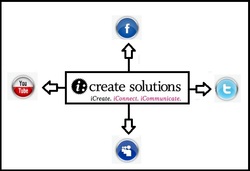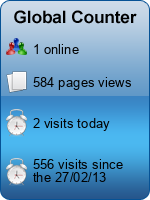
Social Media marketing can be difficult for many small business owners. With an ever growing number of networks with very different functionalities, guidelines and followings, it can be confusing to determine which to incorporate into the marketing strategy and how to do so effectively.
With 91% of on-line adults regularly using social media, most of which are on residential development advertising, it is no longer something which any business can afford to overlook. Society is actually changing and with this growing online lifestyle comes fresh expectations of different things from companies and brands. We are becoming smarter when it comes to the commercial world and with that comes the paradigm shift in marketing strategies. The focus is now more on connecting with clients on a social level and less about the sales pitch. The simple fact is people don’t like to be sold to, so how do we use social media to sell, without selling?
The Top Players In Social Media
♠ Facebook
Facebook is normally the first thing that comes to mind whenever we think of social media, which isn't surprising since it still holds the top spot with over 1 billion active users. With this much influence and reach, Facebook is an evident choice for any small business.
It is a common misunderstanding that almost all Facebook users are usually tenagers and people in their early 20's; however as of August 2012, the age group that experienced the greatest increase on Facebook was 25-34 year olds, meaning that now 67% of users are over 25. As social media is progressing and the ‘digital natives’ are becoming older, a large part of your target market are frequently utilising social media.
The key to Facebook success is spreading content that is concise and consistent with the focus on the customer, not the company. What you may share on Facebook must be interesting enough for followers to like, share and comment on it.
It is important to time your posts carefully, to find that balance between not posting enough and spamming your followers. One feature that Facebook offers for pages is the ability to timetable posts, allowing you to set up your posts for the day, week or month in advance and have them go out at the exact times that you pre-determine. Over time ıt'll become clearer which posts and at what frequency work best for your business and following, however as a general guideline, posts should be at least one per day with no more than one every three hours.
♠ Twitter
Twitter is the second biggest social network and it is completely different to any of the others. Traffic moves much more quickly on Twitter and the articles are restricted to 140 characters or much less. Twitter requires you to be much more active with posting tweets and connecting with other users than other networks. A fair frequency for posting on Twitter will be between eight and ten each day.
The important thing to remember when sending out tweets is that the content shared must provide value to the readers. You’re fighting for your follower’s awareness against the hundreds or thousands of some other users that they are following. The traffic on the home page moves very quickly, so in order to stand out a tweet needs to be as sharable as you possibly can. Try thinking about a tweet like a headline, it should be concise, creative and grab the reader’s eyes. Using hashtags and including other users in your tweets will also help to enhance its sharability.
Using tools such as TweetDeck, Tweetspinner or Hootsuit that help to schedule your Twitter activity is an excellent way to reduce the time you require to actually spend on Twitter. These tools work as a great assistant but you must still keep an eye on yours and others activity to make sure that everything runs smoothly and no opportunities are missed.
♠ LinkedIn
LinkedIn is called the ‘professional network’, making it particularly useful for B2B marketing and networking. LinkedIn offers company pages, through which you can post current vacancies and share updates. A company page should be concise and professional with information about the business, what you do/sell, a link towards the website and contact information.
While the company page is a great feature, the best way to maximise LinkedIn is through your personal, professional profile. Social media is creating a more personable business world and people are more inclined to connect with someone who works for the company, instead of with the company page. Bearing this in mind be sure to have a clear headshot as your profile image, keep your status updates related to your professional life and industry trying to make sure that your profile is 100% finish.
♠ Google+
Google+ is usually overlooked as it is not really a ‘big player’ in the world of online social media, however Google+ provides great benefits for SEO and search engine traffic. Google+ is heavily integrated with Google’s other goods, such as Gmail, Google Docs, Google Maps and of course Google Search.
Google+ Local Pages have also been introduced in place of Google Places and are being integrated to Google Search, Google Maps, and Google Mobile. This change means it’s now even more important for your business to have a verified Google+ page. More info about these changes and the actions that you may need to take is found on Google’s support page for business owners.
Google have also recently launched a Social Search Engine called Search Plus Your World in the US, which is in Australia quickly.
♠ Pinterest
Pinterest is currently the third most popular network after Facebook and Twitter, having gained momentum quickly since its launch in March 2010. This social pin board allows users to share images in collections and categorizations.
Pinterest has announced, on November 14th 2012, that they now have separate Terms of Service for businesses, helping to guide business owners on how to utilize Pinterest. These brand new terms are in line with the introduction of their new business accounts, which offer new features specified to business needs such as a ‘verification badge’ to confirm your website, new buttons as well as widgets to help incorporate your Pinterest page with your website and access to forthcoming features yet to be announced.
♠ Instagram
Instagram is a great tool for giving your business better visibility online and better engaging with the community. This visual platform ties in well with both Facebook and Twitter and is an excellent place to share photos of your items, what is happening backstage, interactions with the community, sneak peeks and so forth. A lot of businesses have had great success using Instagram, because of its simplicity and recognition.
Which Networks Must I Use For My Business?
Which networks you decide to use in your business marketing strategy will depend on the type of business you are running. It’s important to look at your target market and what networks they are engaging with, as this will enable you to decide which networks must be prioritised.
A Facebook page should be the foundation of any kind of social marketing strategy, regardless of your business type people now turn to Facebook just as they do for Google to find a local product or service provider.
Make it Work
Once you have chosen which networks to utilize and have set up your accounts, there are three simple ways to follow to improve the response your business profile receives…
♣ Involve Your Followers - This is the golden rule of social media, to be social. Small businesses hold an advantage here, as they are capable of being more personable and connect directly with their followers online.
♣ Have A Strategy - Social Media marketing is serious business and really should be treated as such. Take time to analyse how people do and will see your business and how certain messages will be received and interoperated.
♣ Have Patience - Social media is not a quick fix. It takes time to view the results, but if you are patient and have a strong strategy in place, the results will be well worth the wait.
Do I Still Need A Website If My Business Uses Social Media?
A business web site is an essential component of a solid and effective online presence. Your business website should be regarded as the online hub, central to all other social media, advertising and email marketing efforts. There are many clever ways that we can make your website integrate with all of your online needs.
For more information check out Icreate Solutions.
With 91% of on-line adults regularly using social media, most of which are on residential development advertising, it is no longer something which any business can afford to overlook. Society is actually changing and with this growing online lifestyle comes fresh expectations of different things from companies and brands. We are becoming smarter when it comes to the commercial world and with that comes the paradigm shift in marketing strategies. The focus is now more on connecting with clients on a social level and less about the sales pitch. The simple fact is people don’t like to be sold to, so how do we use social media to sell, without selling?
The Top Players In Social Media
Facebook is normally the first thing that comes to mind whenever we think of social media, which isn't surprising since it still holds the top spot with over 1 billion active users. With this much influence and reach, Facebook is an evident choice for any small business.
It is a common misunderstanding that almost all Facebook users are usually tenagers and people in their early 20's; however as of August 2012, the age group that experienced the greatest increase on Facebook was 25-34 year olds, meaning that now 67% of users are over 25. As social media is progressing and the ‘digital natives’ are becoming older, a large part of your target market are frequently utilising social media.
The key to Facebook success is spreading content that is concise and consistent with the focus on the customer, not the company. What you may share on Facebook must be interesting enough for followers to like, share and comment on it.
It is important to time your posts carefully, to find that balance between not posting enough and spamming your followers. One feature that Facebook offers for pages is the ability to timetable posts, allowing you to set up your posts for the day, week or month in advance and have them go out at the exact times that you pre-determine. Over time ıt'll become clearer which posts and at what frequency work best for your business and following, however as a general guideline, posts should be at least one per day with no more than one every three hours.
Twitter is the second biggest social network and it is completely different to any of the others. Traffic moves much more quickly on Twitter and the articles are restricted to 140 characters or much less. Twitter requires you to be much more active with posting tweets and connecting with other users than other networks. A fair frequency for posting on Twitter will be between eight and ten each day.
The important thing to remember when sending out tweets is that the content shared must provide value to the readers. You’re fighting for your follower’s awareness against the hundreds or thousands of some other users that they are following. The traffic on the home page moves very quickly, so in order to stand out a tweet needs to be as sharable as you possibly can. Try thinking about a tweet like a headline, it should be concise, creative and grab the reader’s eyes. Using hashtags and including other users in your tweets will also help to enhance its sharability.
Using tools such as TweetDeck, Tweetspinner or Hootsuit that help to schedule your Twitter activity is an excellent way to reduce the time you require to actually spend on Twitter. These tools work as a great assistant but you must still keep an eye on yours and others activity to make sure that everything runs smoothly and no opportunities are missed.
LinkedIn is called the ‘professional network’, making it particularly useful for B2B marketing and networking. LinkedIn offers company pages, through which you can post current vacancies and share updates. A company page should be concise and professional with information about the business, what you do/sell, a link towards the website and contact information.
While the company page is a great feature, the best way to maximise LinkedIn is through your personal, professional profile. Social media is creating a more personable business world and people are more inclined to connect with someone who works for the company, instead of with the company page. Bearing this in mind be sure to have a clear headshot as your profile image, keep your status updates related to your professional life and industry trying to make sure that your profile is 100% finish.
♠ Google+
Google+ is usually overlooked as it is not really a ‘big player’ in the world of online social media, however Google+ provides great benefits for SEO and search engine traffic. Google+ is heavily integrated with Google’s other goods, such as Gmail, Google Docs, Google Maps and of course Google Search.
Google+ Local Pages have also been introduced in place of Google Places and are being integrated to Google Search, Google Maps, and Google Mobile. This change means it’s now even more important for your business to have a verified Google+ page. More info about these changes and the actions that you may need to take is found on Google’s support page for business owners.
Google have also recently launched a Social Search Engine called Search Plus Your World in the US, which is in Australia quickly.
Pinterest is currently the third most popular network after Facebook and Twitter, having gained momentum quickly since its launch in March 2010. This social pin board allows users to share images in collections and categorizations.
Pinterest has announced, on November 14th 2012, that they now have separate Terms of Service for businesses, helping to guide business owners on how to utilize Pinterest. These brand new terms are in line with the introduction of their new business accounts, which offer new features specified to business needs such as a ‘verification badge’ to confirm your website, new buttons as well as widgets to help incorporate your Pinterest page with your website and access to forthcoming features yet to be announced.
Instagram is a great tool for giving your business better visibility online and better engaging with the community. This visual platform ties in well with both Facebook and Twitter and is an excellent place to share photos of your items, what is happening backstage, interactions with the community, sneak peeks and so forth. A lot of businesses have had great success using Instagram, because of its simplicity and recognition.
Which Networks Must I Use For My Business?
Which networks you decide to use in your business marketing strategy will depend on the type of business you are running. It’s important to look at your target market and what networks they are engaging with, as this will enable you to decide which networks must be prioritised.
A Facebook page should be the foundation of any kind of social marketing strategy, regardless of your business type people now turn to Facebook just as they do for Google to find a local product or service provider.
Make it Work
Once you have chosen which networks to utilize and have set up your accounts, there are three simple ways to follow to improve the response your business profile receives…
♣ Involve Your Followers - This is the golden rule of social media, to be social. Small businesses hold an advantage here, as they are capable of being more personable and connect directly with their followers online.
♣ Have A Strategy - Social Media marketing is serious business and really should be treated as such. Take time to analyse how people do and will see your business and how certain messages will be received and interoperated.
♣ Have Patience - Social media is not a quick fix. It takes time to view the results, but if you are patient and have a strong strategy in place, the results will be well worth the wait.
Do I Still Need A Website If My Business Uses Social Media?
A business web site is an essential component of a solid and effective online presence. Your business website should be regarded as the online hub, central to all other social media, advertising and email marketing efforts. There are many clever ways that we can make your website integrate with all of your online needs.
For more information check out Icreate Solutions.

 RSS Feed
RSS Feed
